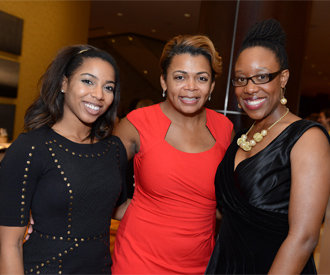« March 2014 Issue
Spotlight on Joia Crear-Perry

From left to right: Jara Crear, Dr. Joia Crear-Perry, and Dara Taylor, Expanding Coverage through Consumer Assitance project director
Joia Crear-Perry, M.D. is a public health expert living in New Orleans, Louisiana, who has served on the Community Catalyst Board of Directors since 2007. She has also served as the director of clinical services for the City of New Orleans Health Department and on the executive committee of the Coalition of Leaders in Louisiana Healthcare and the New Orleans Medical Association. Recently, we asked Dr. Crear-Perry to tell us about her role on the Community Catalyst board, how she has seen the organization’s influence expand, and what she thinks national health reform will mean to the people of Louisiana.
Why were you interested in getting involved with Community Catalyst?
In 2006, immediately post Katrina, Community Catalyst convened health care advocates in Louisiana to discuss how we could come together to improve the health of our community with funding from Public Welfare Foundation. Prior to this convening, I don't think there were any such efforts to engage the community voice in Louisiana health care decision making. The idea that we could make our system actually work for the citizens of the community excited me.
What does serving on the board of Community Catalyst mean to you?
Having the honor of serving on the Community Catalyst board is one of the most fulfilling things I have done in my life. It provides for me an opportunity to be a part of an organization that is shaping policy and giving voice to the people who use the health care system, but who often times are not at the table. I learn from experts on staff and fellow board members, all of us who share the same mission, and I am able to be of service and stretch my brain at the same time... you can't beat that!
How you have seen Community Catalyst grow and expand its influence over the years and what motivates you to support Community Catalyst as a donor as well as a board member?
When I first joined the board, our focus was on increasing access to the health care system for disenfranchised citizens. With passage of the Affordable Care Act, we had a tremendous victory to that end. However, we are working hard to make sure the implementation continues despite many challenges. We have also evolved our work within the health equity fight which is my passion. I have historically sat in too many meetings around health in Louisiana where the only entities represented were physicians (like me), hospitals, and insurance companies. Making decisions that impact the lives of community members without their voice being heard exacerbates the disparities in the lives of these communities. And, the health system must include more public health initiatives including those that address the need for safer public parks in which people can exercise walk, and fewer sugary beverages and desserts. With this broadened view of the system, our mission to expand access will march on.
From your perspective as a physician, what do you think national health reform can deliver to Louisiana and its people?
Can is the operative word. It would have been incredible if our state had not left millions on the table for programs and Medicaid expansion. That being said, we have already begun to see how the ACA, despite strong political opposition, is delivering in our state. We have many non-profit hospitals who are all revamping how they provide a true community benefit. People in Louisiana have historically been diagnosed with diabetes at the time of amputation. We have lived with a sick care model. For example, there are lots of hospital beds and no money for screenings. A law that requires that prevention be covered absolutely saves lives in my community.
What needs to happen for the health justice and reform movement in Louisiana to become more powerful in the face of entrenched political opposition to change?
We fight for housing, education, etc., in Louisiana. It is difficult to get folks to understand the importance of fighting for their health. I wish I could blame it all just on the desires of those who have generated power and money from the current system. However, our biggest challenge has been educating citizens that having a life expectancy that is 25 years less than your neighbors must be changed and they have the power to change it.
What kinds of support does Community Catalyst provide toward gaining a seat for uninsured and other vulnerable Louisianans in state and local decisions affecting their health?
Without the assistance with data and organizing for our grass roots advocates that Community Catalyst has provided to Louisiana since 2006, I am not sure how we could have been able to fight for our community members.
-- R. Scott Reedy, Associate Director, Development
